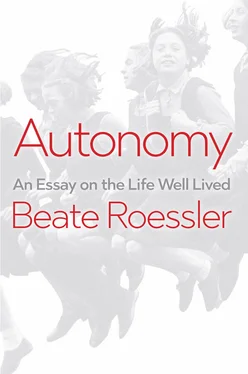1 ...7 8 9 11 12 13 ...20 With this we have already taken a critical step beyond a theory of autonomy oriented solely toward the structure of the individual will. Consequently, for one thing, we have to look back in order to be able to see whether a person can act autonomously; at the same time, we also have to look into the future. Michael Bratman thus argues that a certain harmony must exist between the deliberations and actions a person intends to perform and her medium- and long-term plans, and that we only act autonomously when we conceive of ourselves as always being connected with these plans – what Bratman calls “temporally extended agency.” 30As I will argue in the coming chapters, the criteria of rationality and coherence, as well as of stability, that the idea of plans introduces into autonomous considerations are not only sound but also intuitively adequate. In everyday life, too, we do not consider a person who fails to sufficiently adhere to her plans and intentions to be truly autonomous.
This brings us to our next problem: Can the question of which desires and attitudes ought to guide our actions and which reasons for acting are our own actually be answered without recourse to the content and quality of the options available to us? Substantive theories of autonomy – as opposed to the procedural theories just discussed – argue for an ethical or moral qualification. Susan Wolf contends that Frankfurt’s subjectivist and internalist conception of autonomy is incapable of accounting for the objectivity of reasons and values. Yet, she argues, we cannot plausibly and consistently conceive of autonomy if we do not establish the content of what we want and strive for with reference to what is actually and justifiably desirable, i.e. what is actually good or bad, right or wrong. From a different perspective, Joseph Raz argues that we are capable of acting autonomously only if we also have the right options available to us in society. Thus for Raz, as for Wolf, a person’s autonomy is tied to the question of what she actually chooses to do. This obviously goes well beyond procedural theories in which the important point is not what a person chooses but only how she chooses.
I will discuss in greater detail below whether Susan Wolf’s substantive theory goes too far, as one could argue that whether we live a good or bad, meaningful or meaningless life is not necessarily related to the question of the concept of autonomy. In any case, it is difficult to say anything about this from a liberal viewpoint ‒ difficult, but not impossible, as I will show in the ensuing chapters, which are critical of Wolf but do not argue against all forms of perfectionism. I think that, at the least, a meaningful array of potential choices and decisions is necessary in order to be able to attribute autonomy to persons. This would be a weak form of perfectionism, one that I shall try to advocate from a variety of different perspectives.
As a final step, let us now consider the autonomous person in her social relationships , both from the perspective of feminist critique of the concept of autonomy and from that of the general social and political conditions that are necessary for autonomy to succeed. Relational theories contend that the traditional concept of autonomy is overly rationalistic, individualistic (egoistic), relationless and oriented toward a masculine model of life. Hence they seek to defend a position that critically reformulates this concept of autonomy, arguing that subjects are dialogically constituted in their identity and in their autonomy. This is, first, a genealogical argument: we do not spring up out of the earth like mushrooms (as Hobbes claims) but rather are dependent on substantive social relationships if we are to be able to develop an autonomous personality at all. At the same time, it is also a constitutive argument: persons and their autonomy are constituted by social relationships. 31A further, systematic argument then makes it clear that social relationships are also necessary and constitutive of individual autonomy because persons consistently pose the practical question to themselves in commitments, in relationships, and in contexts of care. It is often in dialogue with others that we first become clearly aware of how we ourselves want to live. That is, we are always and only autonomous together with others, as I argued at the beginning. This also means, however, that we sometimes have to be able to decide against certain others, against their norms and aims, and that we have the freedom and the right to decide against our own family, against our own origins, and thus for other social contexts, if we think that we can live our life well only by making such a decision. 32
Considering the question of the social conditions of autonomy, however, we can actually go one step further here. To wit, being socially embedded also means being reliant on forms of social recognition. It is not possible to act autonomously without a certain sense of self-respect or self-worth. If what a person believes and considers valuable is not recognized, valued, or considered meaningful at least by certain others or certain groups in her social environment, if she cannot conceive of herself, at least in certain basic respects and vis-à-vis certain significant others, as a person who is capable of determining and explaining her own actions and pursuing her own projects; then she cannot act autonomously , on the basis of her own reasons.
Self-respect is therefore a precondition of autonomy – and developing self-respect in turn depends on forms of life that at least in principle recognize the autonomy of persons. A number of authors have described this connection between autonomy and self-respect and its social preconditions. 33Joel Anderson and Axel Honneth, for example, develop an understanding of autonomy based on different forms of recognition, without which the self-evaluative attitudes constitutive of autonomous persons are not possible. They further clarify the ways in which specific social conditions are necessary for cultivating and exercising autonomy. Not only do we require social conditions in order to learn autonomy, the social conditions of recognition also remain necessary for developing and carrying out autonomous projects. Relational theories, moreover, advocate for a richer understanding of agents as not only rational but also emotional, bodily, creative, imaginative. 34This relational or social perspective on autonomy also embraces the idea that social contexts are necessarily always defined by substantive value judgments or ideals that shape the available options autonomous persons can choose from. Hence it is also interested in further external factors that determine the success of autonomy.
Such substantive theories of autonomy are more demanding than procedural theories, requiring many more beliefs, capacities, and social conditions before attributing autonomy to someone. 35This is why they also draw an important distinction between autonomy and agency. Nonautonomous persons, they argue, may be capable of rational action without being autonomous; hence rational agency is a necessary, but not sufficient condition for autonomy.
This conceptual distinction is problematic, however. Are we thus meant to distinguish between autonomous actions and persons on the one hand and simple agency on the other? And then only attribute autonomy to persons who are shaped by the right substantive ideals and at the same time unattached from conventions, as Marina Oshana demands? This would mean that certain social conditions make structurally autonomous agency impossible for certain groups of people, that patriarchal power structures, for example, allow most women only rational agency but not autonomous agency. I find this implausible – not least because there are good arguments for tying the possibility of a meaningful life to that of a self-determined life. Were we to follow Oshana, this would mean that most women lead meaningless lives, which seems to me to be a rather unconvincing outcome.
Читать дальше












